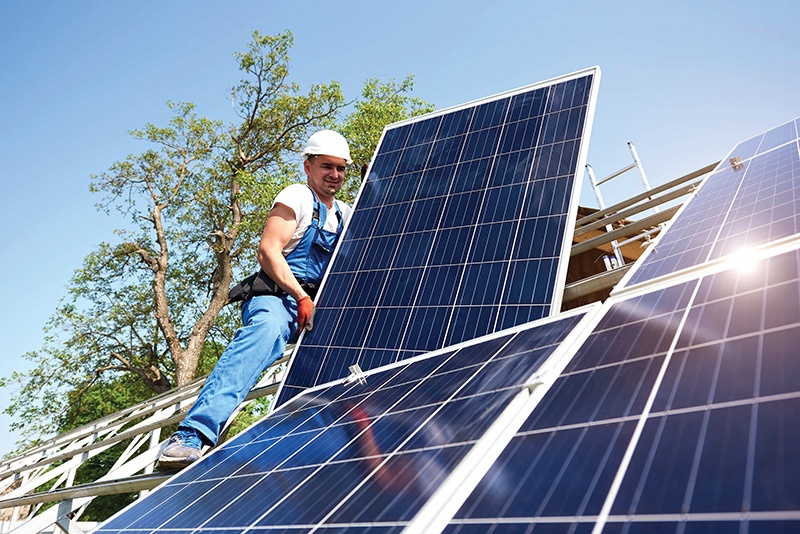Capacity for maximum growth in rooftop solar arena
 |
| Rooftop solar power is a rapidly developing and fiercely competitive sector in Vietnam, Photo: Shutterstock |
The Ministry of Industry and Trade has said that the economic concentration filing by Sojitz Osaka Gas Energy Co. (SOGEC) and LOOOP Inc. is not prohibited under Article 30 of the Law on Competition.
The pair are considering forming a joint venture to promote and expand the rooftop solar power industry in Vietnam, as stipulated by the law. SOGEC will contribute 70 per cent of the charter capital while LOOOP will contribute the remainder. The venture’s area of operation will include the provision of energy generated by solar photovoltaic (PV) systems that it purchases and installs on the rooftops of industrial or commercial clients’ buildings, as well as industrial zone (IZ) businesses and tenants in Vietnam.
SOGEC is a subsidiary of Sojitz Corporation, a Japanese multinational corporation with operations in several countries. Sojitz has subsidiaries and related businesses in a variety of industries in Vietnam, including selling industrial machines, IT, fertiliser manufacturing, logistics services, and gas, as well as creating wood chips and developing IZ infrastructure.
LOOOP is a Japanese business that specialises in the manufacture and marketing of solar panels, as well as the sale, maintenance, and repair of solar modules and related equipment. In contrast, LOOOP has never done business in Vietnam.
The joint company will purchase solar PV systems from worldwide suppliers and install them on the roofs of industrial clients in IZs that demand rooftop solar power. Following that, it will continue to own and maintain the rooftop solar system, selling the electricity generated to consumers in accordance with the provisions of the two parties’ direct power purchase agreement (PPA).
Rooftop solar is a type of renewable energy produced by a PV system, which has its electricity-generating solar panels installed on the roof of a residential or commercial structure to provide backup power in the event of an outage, accounting for a relatively small fraction of an industrial park’s overall electricity consumption.
Furthermore, the rooftop solar power system contributes to less burden on the national grid while boosting corporate efficiency. It is most visible in business investments, notably manufacturing businesses, as rooftop solar power systems enable these organisations to maximise production capacity while also extending the life of the machinery.
Recently, foreign and domestic investors in the rooftop solar business in Vietnam have finally received significant support and encouragement from the government for development as prescribed under various regulations.
Rooftop solar power is a young, rapidly developing, and fiercely competitive sector, with many new entrants likely to boost total installed capacity soon. Hexagon Peak, Shire Oak International, Skylight Power Ltd., SkyX Solar JSC, and Nami Solar Energy JSC are among the newest rivals to enter this industry.
Several months ago, SP Group and BCG Energy JSC, a fully-owned subsidiary of Bamboo Capital JSC, also announced the formation of a joint venture in Vietnam to engage in rooftop solar and explore additional renewable energy projects.
SP stated that it will hold 49 per cent of the venture, while Bamboo Capital’s wholly-owned subsidiary would possess the rest. By 2025, it will have achieved its initial goal of 500MW of rooftop projects, contributing to Vietnam’s goal of generating 30 per cent of its power from renewable sources by 2030.
In addition, Coro Energy Plc, a Southeast Asia-focused company, announced plans this summer to buy 85 per cent of a portfolio of commercial and industrial rooftop solar projects in Vietnam from Vinh Phuc Energy, with a combined capacity of 150MW. The deal commences with a low-cost entry, starting with a 5MW pilot project.
What the stars mean:
★ Poor ★ ★ Promising ★★★ Good ★★★★ Very good ★★★★★ Exceptional
Related Contents
Latest News
More News
- Trung Nam-Sideros River consortium wins bid for LNG venture (January 30, 2026 | 11:16)
- Vietnam moves towards market-based fuel management with E10 rollout (January 30, 2026 | 11:10)
- Envision Energy, REE Group partner on 128MW wind projects (January 30, 2026 | 10:58)
- Vingroup consults on carbon credits for electric vehicle charging network (January 28, 2026 | 11:04)
- Bac Ai Pumped Storage Hydropower Plant to enter peak construction phase (January 27, 2026 | 08:00)
- ASEAN could scale up sustainable aviation fuel by 2050 (January 24, 2026 | 10:19)
- 64,000 hectares of sea allocated for offshore wind surveys (January 22, 2026 | 20:23)
- EVN secures financing for Quang Trach II LNG power plant (January 17, 2026 | 15:55)
- PC1 teams up with DENZAI on regional wind projects (January 16, 2026 | 21:18)
- Innovation and ESG practices drive green transition in the digital era (January 16, 2026 | 16:51)

 Tag:
Tag:




















 Mobile Version
Mobile Version